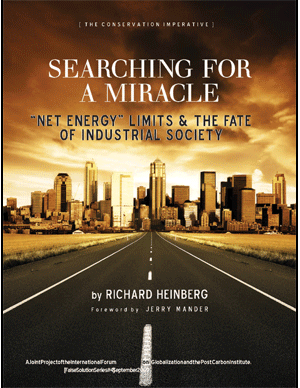
Searching for a Miracle: ‘Net Energy’ Limits & the Fate of Industrial Society
September 30, 2009
Published with International Forum on Globalization
Perhaps the most significant limit to future energy supplies is the “net energy” factor—the requirement that energy systems yield more energy than is invested in their construction and operation.
Abstract
This report is intended as a non-technical examination of a basic question: Can any combination of known energy sources successfully supply society’s energy needs at least up to the year 2100? In the end, we are left with the disturbing conclusion that all known energy sources are subject to strict limits of one kind or another. Conventional energy sources such as oil, gas, coal, and nuclear are either at or nearing the limits of their ability to grow in annual supply, and will dwindle as the decades proceed—but in any case they are unacceptably hazardous to the environment. And contrary to the hopes of many, there is no clear practical scenario by which we can replace the energy from today’s conventional sources with sufficient energy from alternative sources to sustain industrial society at its present scale of operations. To achieve such a transition would require (1) a vast financial investment beyond society’s practical abilities, (2) a very long time—too long in practical terms—for build-out, and (3) significant sacrifices in terms of energy quality and reliability.
Perhaps the most significant limit to future energy supplies is the “net energy” factor—the requirement that energy systems yield more energy than is invested in their construction and operation. There is a strong likelihood that future energy systems, both conventional and alternative, will have higher energy input costs than those that powered industrial societies during the last century.We will come back to this point repeatedly.
The report explores some of the presently proposed energy transition scenarios, showing why, up to this time, most are overly optimistic, as they do not address all of the relevant limiting factors to the expansion of alternative energy sources. Finally, it shows why energy conservation (using less energy, and also less resource materials) combined with humane, gradual population decline must become primary strategies for achieving sustainability.
Español: En busca de un milagro: Los límites de la ‘energía neta’ y el destino de la sociedad industrial
